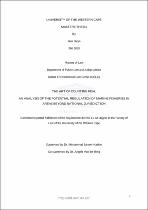| dc.contributor.advisor | Kasker, Muhammad Sameer | |
| dc.contributor.author | Steyn, Jaco | |
| dc.date.accessioned | 2022-03-30T08:09:24Z | |
| dc.date.available | 2022-03-30T08:09:24Z | |
| dc.date.issued | 2022 | |
| dc.identifier.uri | http://hdl.handle.net/11394/8990 | |
| dc.description | Magister Legum - LLM | en_US |
| dc.description.abstract | The 1982 United Nations Convention on the Law of the Sea (1982 UNCLOS) is ineffective in ensuring the conservation and long-term sustainability of marine fisheries in Areas beyond national Jurisdiction (ABNJ). This is a result of the lacuna in Part VII of the 1982 UNCLOS containing the framework provisions governing the conservation and management of marine living resources in ABNJ. The lacuna relates to the fact that the 1982 UNCLOS fails to address the threats posed by high seas fisheries to the long-term sustainability of the marine environment and the marine biological diversity found therein. The lacuna has not gone unnoticed by the international community as international laws and policies have been developed to address the issues plaguing the fisheries regime in ABNJ. | en_US |
| dc.language.iso | en | en_US |
| dc.publisher | University of the Western Cape | en_US |
| dc.subject | Global environmental law | en_US |
| dc.subject | International fisheries law | en_US |
| dc.subject | High Seas Fisheries | en_US |
| dc.subject | Sustainable development | en_US |
| dc.subject | Marine biological diversity | en_US |
| dc.title | The art of counting fish: An analysis of the potential regulation of marine fisheries in areas beyond national jurisdiction | en_US |
| dc.rights.holder | University of the Western Cape | en_US |

